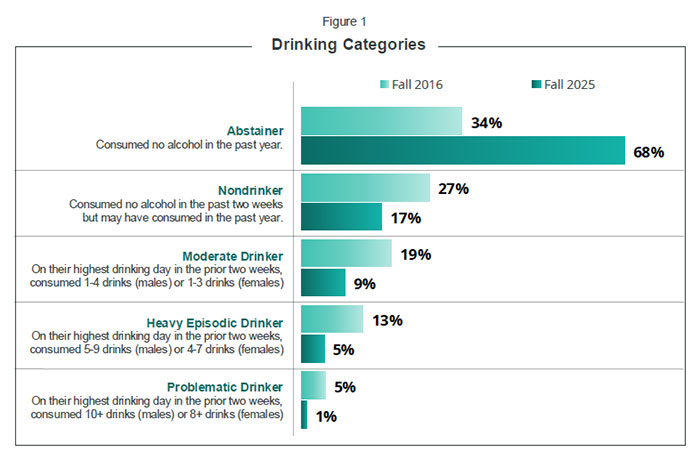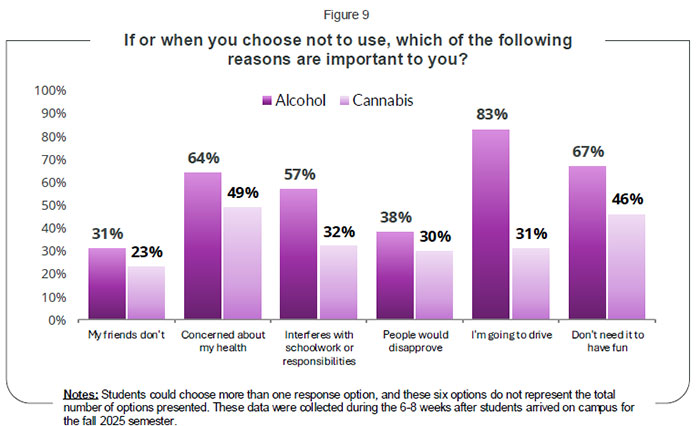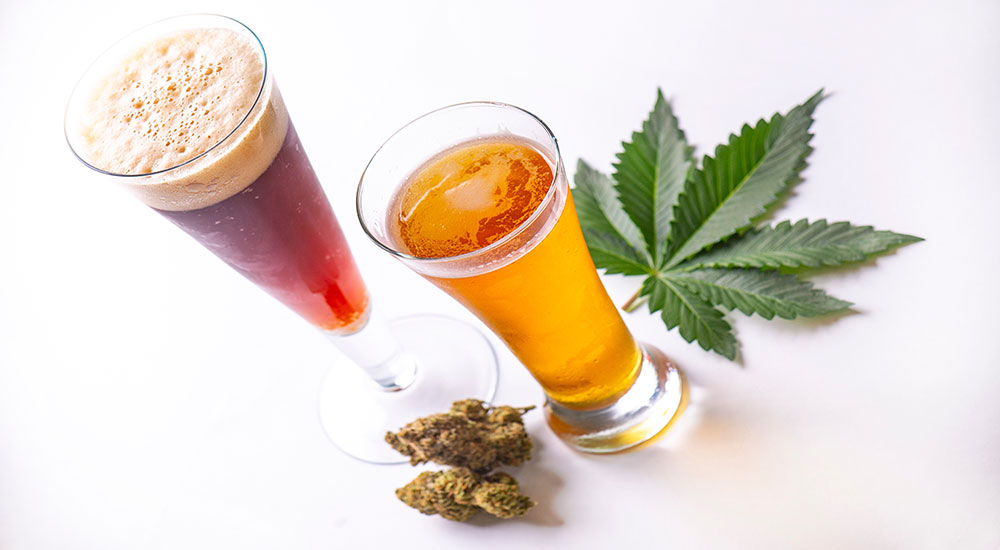Fewer college students are drinking alcohol but are smoking more weed, according to a new report.
The third annual Campus Prevention Network (CPN) National Insights Report, “Redefining the College Effect: Key Insights on Substance Use Among College Students,” reveals a major shift in substance use among college students, according to a press release.
RELATED: Simultaneous Alcohol and Cannabis Use Among College Students Linked to Depression
The report analyzes aggregated data from 832,260 students across 723 colleges, universities, and organizations who participated in at least one of a select group of educational training courses offered by Vector Solutions. It found the number of students who do not drink at all has doubled since 2016, increasing from 34% to 68% (Figure 1).Younger students are leading the shift in abstinence, the report says, with 71% of students age 19 and under reporting no drinking in the past year compared to 47% of those 20 and older.

Image Source: Redefining the College Effect: Key Insights on Substance Use Among College Students
On the contrary, 47% of students reported using cannabis without a doctor’s order in the previous two weeks, which is up from 14% in 2016 (Figure 6). Students 19 and under show the highest cannabis use rates at 51%.

Image Source: Redefining the College Effect: Key Insights on Substance Use Among College Students
These findings, the researchers say, demonstrate a shift in what has traditionally been known as the College Effect, which refers to the significant impact the college environment has on students’ attitudes, perceptions, and behaviors. Historically, the College Effect has referred to increased high-risk drinking in college students, particularly during the first few weeks of school, when students have been considered most likely to consume alcohol and engage in riskier drinking behaviors.
“Historically, college life was seen as a catalyst for increased drinking, but these data suggest a fundamental redefinition of the ‘College Effect,'” the researchers wrote. “Today, we’re seeing a reversal in the standard definition — students are drinking less, substituting cannabis for substances like alcohol, and thinking more about their choices.”
Why Are College Students Drinking Less?
The analysis also highlights students’ main reasonings for drinking less. These include
- Health: Students are increasingly reporting health reasons as their motivation to abstain from alcohol, with 64% citing negative health consequences, which is up from 55% in 2023.
- Safety: Another 83% reported driving under the influence is a protective factor in choosing not to drink — up from 76% in 2023. Nearly one-third of students also report they are unsure of their own limit with alcohol, and 31% report not feeling prepared to help a peer who has had too much to drink.
- Social circles: About 31% of students said they don’t drink because their friends don’t, and another 67% said they don’t need alcohol to have fun.
- Obligations: 57% of respondents said they choose not to drink alcohol because it interferes with their schoolwork or other responsibilities.
“This redefinition challenges many of the prevention models institutions have relied on for years,” said Mike Martynowicz, PhD, Research Lead, Education at Vector Solutions. “Using data to better understand the evolving motivations, pressures, and protective factors influencing today’s students should be a priority for institutions seeking to create a more supportive campus environment.”
Why Are College Students Smoking More Weed?
While college students are more likely to abstain from alcohol consumption in recent years, the researchers suggest it is partially explained by an increase in the use of other substances, particularly cannabis, as it has been legalized for recreational use in two dozen states.
The researchers also note that students who choose not to use cannabis are reporting a slight decrease in their confidence for abstinence in recent years, suggesting a “gradual erosion of the fear and social stigma that have traditionally impacted their views towards cannabis use.” Current college students demonstrate a markedly different risk assessment profile when comparing alcohol and cannabis use, with many college students expressing greater concern about the potential negative consequences associated with alcohol consumption (Figure 9).

Image Source: Redefining the College Effect: Key Insights on Substance Use Among College Students
“Universities must expand their substance abuse prevention and treatment services beyond traditional alcohol-focused approaches to address the diverse array of substances students are now using, including developing specialized interventions for cannabis use disorders and polysubstance use patterns,” the researchers suggest. “Furthermore, these trends necessitate updated campus policies that reflect current legal landscapes around cannabis while maintaining clear educational messaging about academic performance impacts, mental health risks, and legal considerations that vary significantly across state and federal jurisdictions.”

